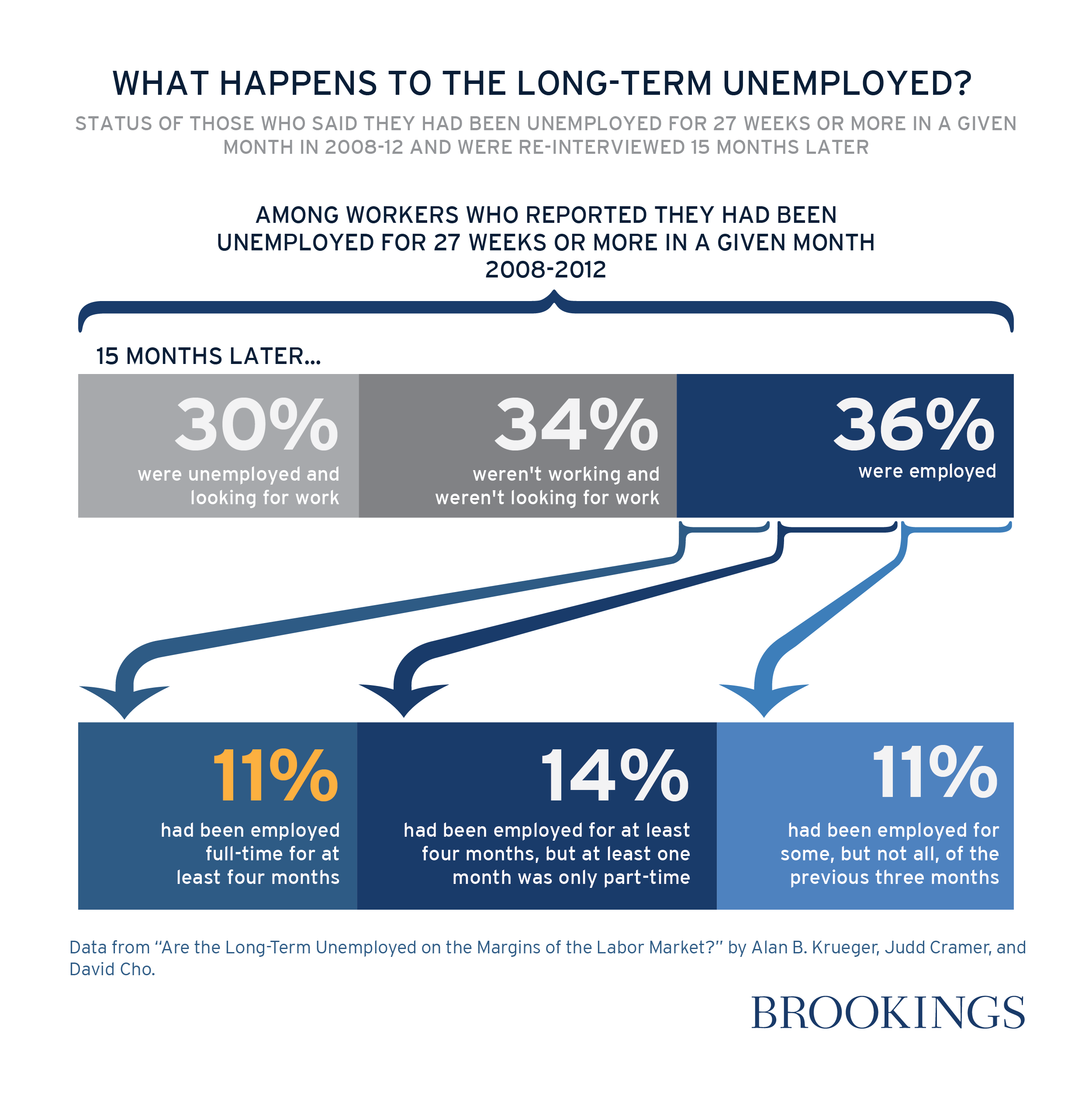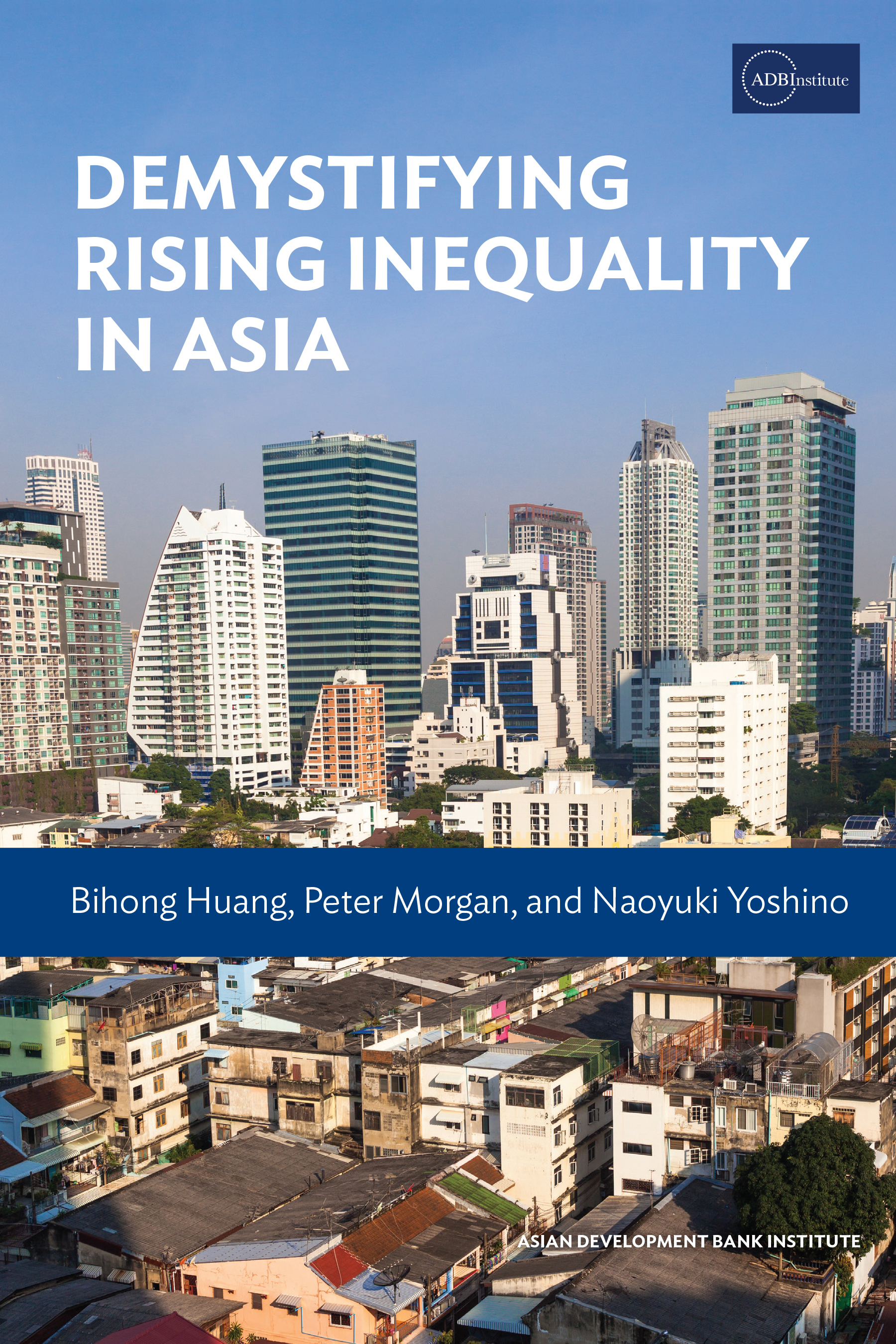In “Are the Long-Term Unemployed on the Margins of the Labor Market?” Alan B. Krueger, Judd Cramer, and David Cho of Princeton University find that even after finding another job, reemployment does not fully reset the clock for the long-term unemployed, who are frequently jobless again soon after they gain reemployment: only 11 percent of those who were long-term unemployed in a given month returned to steady, full-time employment a year later.
See our full infographic on the long-term unemployed »

Long-term unemployment has remained a persistent problem post-Great Recession – a somewhat new issue for the U.S., as compared to Europe. Despite declining over the last 4 years, the share of the unemployed who have been out of work for more than 6 months still exceeds its previous peak reached in 1981-82, and is well above its average in the last recovery, the authors note. Yet, measures of short-term unemployment are close to their average rates in the last recovery. As a result, overall unemployment remains elevated because of the large number of people who have been unemployed long term.
The long-term unemployed are spread throughout all corners of the economy, with a majority previously employed in sales and service jobs (36 percent) and blue collar jobs (28 percent), they find. In addition, the authors find that when long-term unemployed workers do return to work, there is a tendency to return to jobs in the same set of industries and occupations from which the workers were displaced.
The authors present a calibrated model that shows that the collapse in job vacancies, coupled with a decline in labor force withdrawal rates, accounts for the sharp rise in the number of long-term unemployed workers in 2009-13 and the overall rise in the unemployment rate. Furthermore, the authors show that the historically slower rate of reemployment for long-term unemployed workers can account for the apparent shift in the relationship between the unemployment rate and job vacancies. Their model predicts that the unemployment-vacancy relationship will return to its original position as the long-term unemployed continue to exit the labor force.
The long-term unemployed have problems finding work wherever they are, even in states with the lowest unemployment – Hawaii, Iowa, Kansas, Minnesota, Montana, Nebraska, New Hampshire, North Dakota, Oklahoma, South Dakota, Utah, Vermont, Virginia, and Wyoming – where the average unemployment rate was 4.4 percent (compared to 7.0 elsewhere). Even in those 14 states, long-term unemployment grew dramatically during the recession, reaching 4.5 times its historical average, suggesting that long-term unemployment will be a lingering problem even if the unemployment rate returns to normal.
Past research has found that the longer a worker is unemployed, the less time they spend searching for a job, the fewer job applications they submit, and the less likely they are to be called in for an interview for the jobs to which they do apply.
Comparing the unemployed to the employed as a whole, the authors find that the unemployed are younger, less likely to be married, and less well-educated (about one third of employed workers have a bachelor’s degree, while less than 20 percent of the unemployed have one; nearly 20 percent of the unemployed lack a high school diploma – twice the rate for the employed). But breaking out the long-term vs. short-term unemployed, the authors find similarities in educational achievement in the two groups (other than high school dropouts), in industry and occupational distributions, and with few differences between urban and rural areas. A larger proportion of the long-term unemployed is over age 50 and is unmarried compared to the short-term unemployed. Fully 44 percent of the long-term unemployed were never married, while nearly 20 percent are either widowed, separated, or divorced. In addition, African Americans comprise 22 percent of the long-term unemployed, compared with just 10 percent of the employed population.
The authors conclude that, to a considerable extent, the long-term unemployed are an unlucky subset of the short-term unemployed.
Comparing the U.S. to other developed countries, they find:
- In Italy, just under a quarter of all workers are ages 15-34, yet they represent nearly half of the long-term unemployed. Only 15 percent of the long-term unemployed in Italy are 50 or older, compared with 31 percent in the U.S. In addition, a high percentage (56) of Italian long-term unemployed workers have less than a high school education, whereas in the U.S., only 18 percent of the long-term unemployed lack a high school degree. These differences suggest that long-term unemployment in the U.S. reflects a different phenomenon than it does in countries that have had persistently high long-term unemployment.
- In Sweden, the share of the long-term unemployed jumped from 20 percent to 50 percent after its severe financial crisis in the early 1990s, and slowly fell to near its pre-crisis levels, before rising again in the latest recession.
- In Canada, the long-term unemployed typically made-up a higher share of the unemployed compared to the U.S., although the share of long-term unemployed workers trended down from the early 1990s to the Great Recession, and is now almost half the U.S. share.







